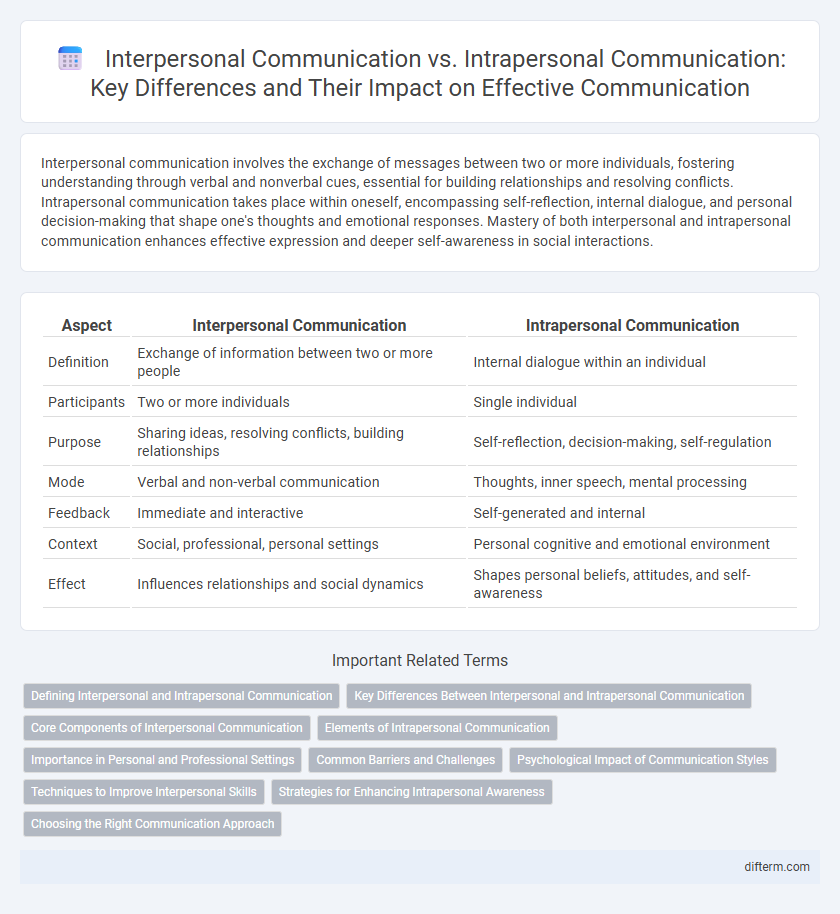Interpersonal communication involves the exchange of messages between two or more individuals, fostering understanding through verbal and nonverbal cues, essential for building relationships and resolving conflicts. Intrapersonal communication takes place within oneself, encompassing self-reflection, internal dialogue, and personal decision-making that shape one's thoughts and emotional responses. Mastery of both interpersonal and intrapersonal communication enhances effective expression and deeper self-awareness in social interactions.
Table of Comparison
| Aspect | Interpersonal Communication | Intrapersonal Communication |
|---|---|---|
| Definition | Exchange of information between two or more people | Internal dialogue within an individual |
| Participants | Two or more individuals | Single individual |
| Purpose | Sharing ideas, resolving conflicts, building relationships | Self-reflection, decision-making, self-regulation |
| Mode | Verbal and non-verbal communication | Thoughts, inner speech, mental processing |
| Feedback | Immediate and interactive | Self-generated and internal |
| Context | Social, professional, personal settings | Personal cognitive and emotional environment |
| Effect | Influences relationships and social dynamics | Shapes personal beliefs, attitudes, and self-awareness |
Defining Interpersonal and Intrapersonal Communication
Interpersonal communication involves the exchange of information, feelings, and meaning between two or more individuals through verbal and nonverbal messages. Intrapersonal communication refers to the internal process of self-reflection, thought, and decision-making within an individual. Understanding the distinctions between interpersonal and intrapersonal communication is essential for improving personal interactions and self-awareness.
Key Differences Between Interpersonal and Intrapersonal Communication
Interpersonal communication involves the exchange of messages between two or more individuals, emphasizing social interaction, verbal and nonverbal cues, and feedback mechanisms. Intrapersonal communication occurs within an individual, encompassing self-reflection, internal dialogue, and decision-making processes. Key differences include the presence of external participants in interpersonal communication versus the internal focus of intrapersonal communication, along with the complexity of social context in the former and the introspective nature of the latter.
Core Components of Interpersonal Communication
Interpersonal communication involves direct, dynamic exchanges between two or more individuals, relying on core components such as verbal and nonverbal messages, active listening, and feedback loops to establish understanding. Key elements include sender-receiver roles, message encoding and decoding, and contextual factors that influence interpretation. Effective interpersonal communication promotes relational development, conflict resolution, and emotional expression within various social settings.
Elements of Intrapersonal Communication
Intrapersonal communication involves internal processes such as self-talk, self-reflection, and internal decision-making that shape an individual's thoughts and emotions. Key elements include self-awareness, internal dialogue, and personal perception, which influence how individuals interpret experiences and regulate behavior. This form of communication enhances self-understanding and impacts emotional intelligence and decision-making skills.
Importance in Personal and Professional Settings
Interpersonal communication enhances collaboration and relationship-building in professional environments by enabling effective exchange of ideas and feedback. Intrapersonal communication fosters self-awareness and decision-making skills, crucial for personal growth and emotional intelligence. Mastery of both communication types drives success by balancing external interactions with internal reflection in diverse settings.
Common Barriers and Challenges
Interpersonal communication often faces barriers such as misunderstandings, emotional interference, and cultural differences that hinder message clarity and relationship building. Intrapersonal communication challenges include negative self-talk, cognitive biases, and lack of self-awareness that affect internal decision-making and emotional regulation. Both communication types require overcoming psychological and environmental obstacles to ensure effective information processing and expression.
Psychological Impact of Communication Styles
Interpersonal communication shapes social interactions and influences emotional well-being by facilitating empathy, conflict resolution, and relationship building. Intrapersonal communication, involving self-talk and internal dialogue, plays a crucial role in self-awareness, stress management, and cognitive processing. The psychological impact of adaptive communication styles includes reduced anxiety, enhanced emotional regulation, and improved mental health outcomes.
Techniques to Improve Interpersonal Skills
Active listening, empathy, and clear verbal expression are essential techniques to enhance interpersonal communication skills, fostering better understanding and stronger connections between individuals. Practicing nonverbal cues like eye contact, body language, and facial expressions also significantly improves message clarity and emotional resonance. Regular feedback and reflective practices help individuals identify communication barriers and develop more effective conversational strategies.
Strategies for Enhancing Intrapersonal Awareness
Developing intrapersonal awareness requires reflective practices such as journaling and mindfulness meditation, which help individuals recognize their thoughts and emotions. Utilizing cognitive restructuring techniques enhances self-perception by challenging negative self-talk and promoting positive inner dialogue. Implementing regular self-assessment tools enables continuous monitoring of personal growth and emotional regulation in intrapersonal communication.
Choosing the Right Communication Approach
Choosing the right communication approach hinges on understanding the distinctions between interpersonal and intrapersonal communication: interpersonal communication involves direct interaction between two or more individuals, facilitating exchange of ideas, emotions, and feedback, while intrapersonal communication focuses on internal dialogue and self-reflection that shapes one's thoughts and decision-making. Effective communicators assess their goals, context, and audience to decide whether engaging others or processing information internally leads to clearer understanding, problem-solving, or emotional regulation. Mastery of both communication types enhances emotional intelligence, conflict resolution skills, and overall relational dynamics in personal and professional settings.
interpersonal communication vs intrapersonal communication Infographic

 difterm.com
difterm.com